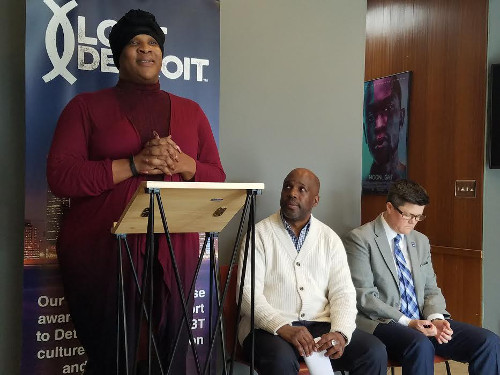
Equality Michigan Transgender Victims Advocate Jeynce Poindexter shares her experience with discrimination. Also pictured are Curtis Lipscomb, executive director of LGBT Detroit and Stephanie Williams, executive director of Equality Michigan. BTL Photo: Jason A. Michael
The transgender community has support in the form of data to convince lawmakers in the state that discrimination based on gender identity exists. Michigan-specific results from the 2015 U.S. Transgender Survey were revealed in various locations throughout the state Wednesday by representatives from LGBT rights organizations and members of the transgender community.
Equality Michigan, LGBT Detroit and the Trans Sistas of Color Project held an early morning press conference at LGBT Detroit's office in northwest Detroit to discuss the survey conducted by the National Center for Transgender Equality.
The examination of the experiences of nearly 28,000 transgender individuals nationwide, including nearly 900 Michigan residents, showed that 19 percent of respondents were unemployed and 30 percent were living in poverty.
In addition, 79 percent of those who were out or perceived as transgender at some point between kindergarten and 12th grade experienced some form of mistreatment such as being verbally harassed, prohibited from dressing according to their gender identity, disciplined more harshly or physically or sexually assaulted.
"We need to make policymakers in Lansing and Washington, D.C. stop stoking anti-trans fears and start talking about the many real challenges faced by trans Michiganders," said Curtis Lipscomb, executive director of LGBT Detroit. "Every minute that we spend on scare tactics we are not talking about the problems in real people's lives."
Other startling statistics in the report reveal that 61 percent of respondents avoided using a public restroom in the past year because they were afraid of confrontations or other problems they might experience. Also, 36 percent of respondents limited the amount that they ate or drank to avoid using the restroom while eight percent reported that someone had denied them access to a restroom.
Housing accommodations was another area of concern with 20 percent of respondents indicating that they had experienced homelessness in the past year and 34 percent had experienced homelessness at some point in their lives. More than a quarter of respondents said they had experienced some form of housing discrimination in the past year. This included being evicted from their home or being denied a home or apartment because of being transgender.
Bre Campbell, executive director of the Trans Sistas of Color Project, explained that she had been evicted because of her gender identity. She sought legal representation but was told she had no case.
"The lawyer stated to me that if I was discriminated against because I was black or even fat I would have a case," she said. "But there are no trans protections in Michigan. So I really commend National Center for Transgender Equality for taking on the responsibly of putting together a survey that not only speaks to the violence that we experience as trans individuals but also counting us in a way that was meaningful and in a way that really speaks to our experiences."
Jeynce Poindexter, transgender victims advocate for Equality Michigan, said she faced discrimination recently when trying to fill a prescription. Poindexter was allegedly told by an employee of CVS that Blue Cross would not pay for her prescription because she was "misgendered" and that they'd have to have her permission to go into their system and change her gender to male.
"It was humiliating," said Poindexter. "In that moment I wasn't this warrior. I wasn't this fighter. I was a victim."
Poindexter is not alone. A quarter of survey respondents indicated they had experienced a problem in the past year with their health insurance in relation to being transgender. Meanwhile 38 percent of those who saw a health care provider reported having at least one negative experience. This included being refused treatment, verbally harassed, physically or sexually assaulted or having to teach the provider about transgender people in order to get appropriate care.
As a result of this kind of discrimination, 25 percent of respondents chose not to see a doctor when they needed to because of fear of being mistreated as a transgender individual. Nearly half of respondents indicated they had experienced serious psychological distress in the month before completing the survey and 14 percent reported that a professional such as a psychologist, counselor or religious advisor tried to stop them from living as their authentic selves.
"We've heard some very powerful individual stories but these really aren't individual problems," said Stephanie White, executive director of Equality Michigan. "When you see the results of the survey you understand this is a Michigan problem. This is a pervasive problem. This is a U.S. problem all over the country. Transgender individuals face these injustices in every walk of life."
Like Lipscomb, White holds lawmakers in the state responsible for taking action.
"Detroit has passed non-discrimination laws," White said. "Over 40 cities across our state have passed non-discrimination laws. But that's piecemeal. We need a statewide solution. And we know in places where we've passed non-discrimination laws everyone does better. This isn't really a debate. There are no states that have passed non-discrimination laws who have suffered as a consequence.
"Our state needs leaders to step up," White continued. "It's time – it's past time – to do something about this."











